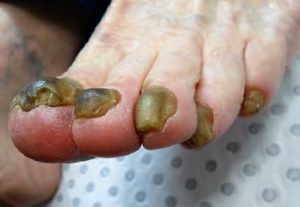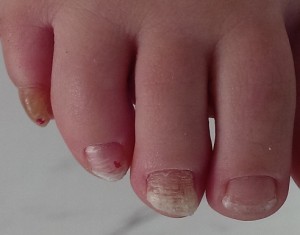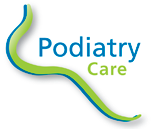What are fungal nails?
Onychomycosis is a fungal infection of the nail which often causes thickening and discoloration of the nail plate. Often callus (dead skin) is broken down and builds up beneath the nail plate. Sometimes the nail will even change shape. Of all fungal infections that occur on the body, nail infections are one of the most difficult to prevent and treat.

What causes it?
Onychomycosis is caused by an overgrowth of fungi which have a tendency to thrive and grow in all warm, moist places. The fungus usually commences growth at the end of the nail plate and continues to spread under the nail. Sometimes chalky, white plaques form on the nail surface and as the infection progresses yellowish, brownish discoloration may be seen. Cell damage by the fungus to the base of the nail can cause the nail to thicken and change shape.
How is it treated?
Fungal infections of the nail are treated in two(three) ways:
- Conservatively
- Surgically
- With the use of Laser
Conservative treatment involves:
- A visit to the podiatrist for cutting and thinning of the nails;
- An anti-fungal topical medicament is then prescribed and applied. It’s applied very much like nail polish. This treatment will occasionally help to prevent spreading of the infection to nearby nails and helps to cure the infected nail.
Prevention of reinfection is very important. If this is not carried out, treatment will fail.
If skin has been infected then advice on management of the surrounding tinea pedis will be needed. Your podiatrist will advise you on this.
Treat the infection that exists in your shoes with anti-fungal spray. Apply anti-fungal spray once a day for the first week and then after shoes are worn.
Surgical treatment
Surgical treatment of nails infected with fungus (Onychomycosis) involves administering Local Anesthetic and removal of the nails. This can then be combined with the application of a topical medicament as the nail regrows. Alternatively a medication which prevents the nail from regrowing can be applied. Surgical treatment is only considered when all other options have been tried without success.
Laser treatment for fungal nail infections
Laser Treatment for fungal nail infections is now available at Podiatry Care. The team at Podiatry Care are the first to incorporate leading German laser technology to deal with fungus affecting toe nails and have over 5 years experience in administering laser treatment.
You may have spoken with your Podiatrist in the past about treating fungal nail infections. Without doubt it is one of the more difficult conditions to successfully treat. Until now messy and ineffective topical creams and ointments along with hazardous oral anti-fungal medications have been the only treatment available.

Often the side effects of the drugs and the inability of the medication to penetrate the nail and nail beds have meant poor compliance and subsequently very poor outcomes. The introduction of the 1064 Diode laser has meant we can now treat this embarrassing and often extremely stubborn condition with a success rate of up to 80%.
The treatment is safe, requires no anesthesia, there are no side effects and is a “walk in, walk out” procedure.
The patients love the ease of the procedure. The technology is so advanced that the only perceivable sensation is a slight warming effect. Even the most affected nails can be treated, with a great improvement in the appearance of the nails in 3 to 4 months following laser treatment.
Podiatry Care continues its reputation of providing cutting edge treatment technologies to the people of SA and is thrilled with the opportunity to provide laser treatment for this persistent problem.
Call Podiatry Care and ask about our special GAP FREE* assessment to see if you qualify for Laser treatment of your toe nail fungus.


